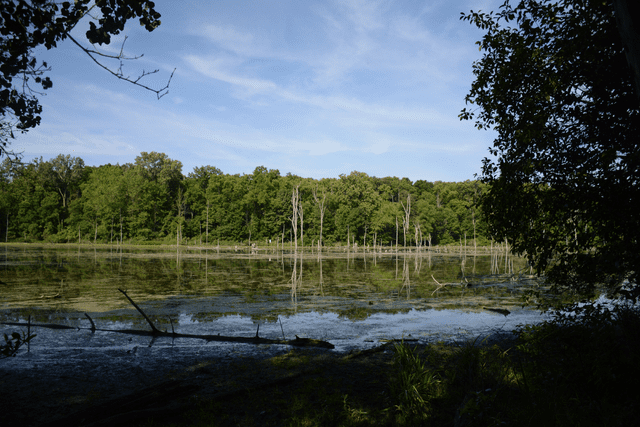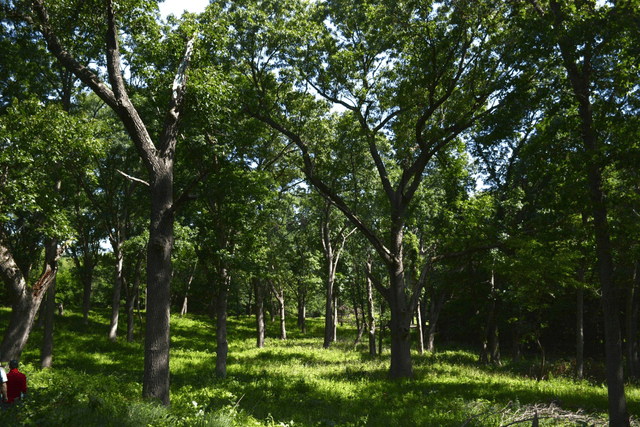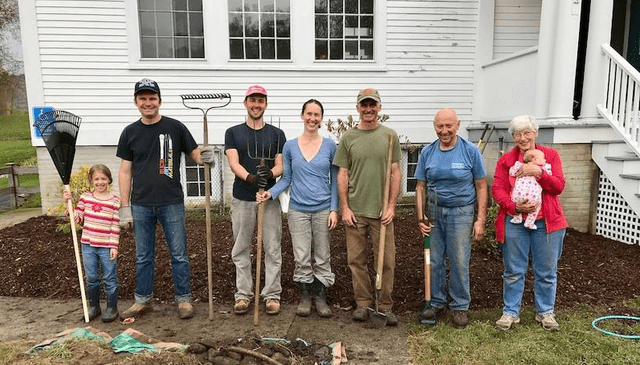Tree planting, green investing, sustainable farming, disaster relief… and faith? Yes and amen! The Mennonite Church USA has their (muddy) boots on the ground to bring peace and harmony with nature, and they’re linking many of their efforts through the Mennonite Creation Care Network.
Creation Care Pioneers at Merry Lea Environmental Center
When the Merry Lea Environmental Center at Goshen College first began in the 1960s, the founders believed the center should connect faith and the environment, a connection that was even less common back then. In fact, the center was originally called Merry Lea Religion and Nature Center. Today, that relationship is sustained by the Mennonite Creation Care Network.
The Mennonite Creation Care Network came into being in 2005 when Luke Gascho, the then executive director of Merry Lea, became concerned about how little environmental organization existed in the Mennonite Church. There had been a volunteer task force committed to connecting faith with the environment, but it had recently disbanded.

“Luke was very involved in the Mennonite Church,” said Jennifer Schrock, the current leader of the Mennonite Creation Care Network. “He was instrumental in starting the Mennonite Creation Care Network,” she added, while acknowledging it has always operated out of Merry Lea. Schrock joined Merry Lea part-time in 2002 as a grant writer for the biological station’s sustainable buildings and has assumed various roles at the center ever since. Schrock’s lifelong love of nature and abiding faith have kept her connected to and passionate about the center’s efforts.
Claim, Discover, Confess, Act: The Pillars of MCCN’s Mission
Merry Lea tends to serve a very different audience than the Mennonite Creation Care Network. The environmental center primarily serves Indiana locals and students connected to Goshen College. The Mennonite Creation Care Network reaches congregations and organizations all across the United States and Canada. It aims to bridge the gap between our faith traditions and the necessity for people to take care of our planet.
The Network’s first goal is to root the church in the biblical and theological resources that the Christian faith has on creation care. While creation care might seem to be a novel concept in modern times, it actually isn’t new. Christians need to stake their claim on these roots and embrace them. “This is not a time we can leave any positive heritage lying fallow,” Schrock said.

While some environmental narratives can feel pessimistic, creation care “brings a unique vision to the world.” Faith communities can bring hope and resurrection into the climate conversation. The second goal of the Network is to help people discover the kingdom of God in a larger sense. “Everything is interconnected,” Schrock shared, “we are deeply connected to the earth and natural world.”
The third goal of the Network has to do with inviting congregations into confession and repentance regarding the harm we’ve done to others and to the environment. Finally, the Network encourages the church to act faithfully to restore the earth.
Making Creation Care Connections through Mennonite Congregations
The Mennonite Creation Care Network (MCCN) exists “to link people to each other, to resources, and to the Mennonite faith tradition in ways that promote harmony with earth.”
There are currently 15 Canadian and 64 U.S. “Green Patchwork Congregations,” congregations that have been active in creation care at some point in the past ten years and have communicated with MCCN about it. Each congregation appoints a Creation Care Liaison who stays in touch with MCCN and works together with their church to actively engage in sustainability initiatives. Congregations are invited to assess their church’s impact using the MCCN Greener Congregation Score Sheet.
Mennonite churches are busy all over the globe engaging in creation care initiatives. MCCN offers a Net Zero Energy Grant for churches who are exploring solar energy, car charging stations, or other renewable energy solutions. They also offer a small grant for church or Mennonite-related nonprofits. One grant recipient came up with a creative way to address climate change in a community that is a little more rural and conservative; they started a summer program for youth where they learn about endangered species and then make wooden representations of the species with a local artist. “People do care about their local species and plants and animals – if you think about what is going extinct in their region it becomes less politicized,” Schrock shared.
Another congregation in Arizona developed a website about their region for watershed education. Community gardening is something that resonates with Mennonites, and many churches use land in that way, often donating produce to local food pantries. Big or small, the goal is to get people outside and to connect with creation.
“We pick one or two shared practices every six months to encourage congregations to do something together,” said Schrock. There’s power in a shared commitment that spans communities. MCCN partners with an organization or a congregation whose efforts should be lifted up and spread more broadly. Projects have included tree planting, river cleanups, church energy audits, and more, often a mix of practical and hands-on with something that’s a little more justice oriented.
Creation Care Outreach and Education
Beyond individual church relationships, the Mennonite Creation Care Network strives to build bridges with other organizations and provide resources to congregations everywhere. Together with the Center for Sustainable Climate Solutions (CSCS), MCCN recently met with 19 different organizations affiliated with the Mennonite Church USA who are engaging in climate and creation care, from a sustainable farming center to green investing to a Mennonite disaster service. Together they are starting to look at how the organizations can support each other.
Through its affiliation with the Mennonite Church USA and Mennonite Church Canada, MCCN has created a curriculum for churches to help connect their faith with their place. “Every Creature Singing” helps congregations explore how the Mennonite faith champions sustainability initiatives and environmental justice, where in their circle of influence creation might be struggling, what churches can do about it, and what spiritual practices might help people care for the earth. The curriculum is written for the Mennonite denomination but is available for use in any community of faith.
MCCN will present three workshops at the upcoming biannual Mennonite convention. MCCN and CSCS will promote strategic plans for how congregations can approach creation care no matter where they are on that journey. MCCN will partner with the CSCS on a second panel about environmental issues.
She believes the Bible has a lot to say on the subject of a changing climate. “I think a lot of people don’t make the connection. ‘Science tells us this, so what does the Bible add to the discussion?’ But if you look at what we do when disaster is staring us in the face—we know what changes are needed but we don’t know how to stop it—there’s lots of guidance there!”
Learn more about the Mennonite Creation Care Network.





 Copyright
2024
Root and Vine
Copyright
2024
Root and Vine